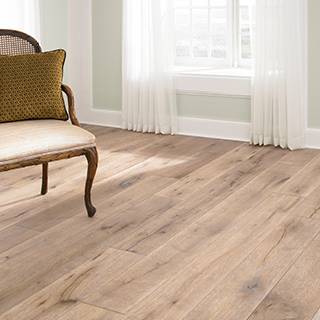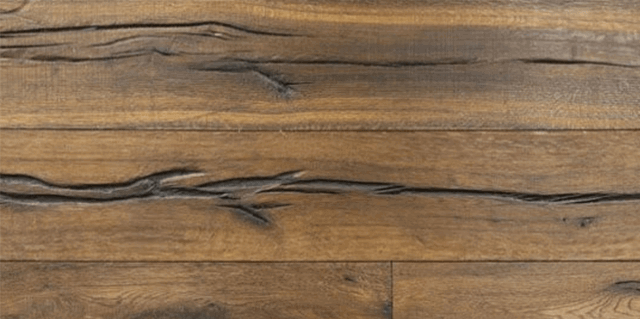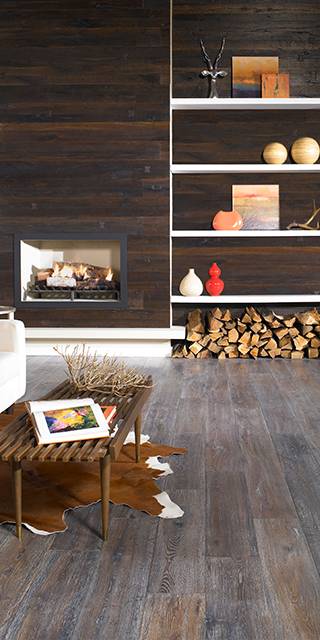Hardwood Flooring In Kitchens – Our Suggestions
November 15, 2021
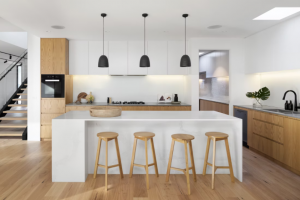
[Image source: Unsplash]
Hardwood is one of the most attractive flooring materials you can get. No matter how you look at it, it will almost always add value to your house. In an ideal space, hardwood flooring can last anywhere from fifteen to thirty-five years, depending on how you maintain it. It is easily possible to do even better than that, as long as you invest some time and effort into periodic maintenance.
There are many misconceptions that have formed over the years about the practicality of using hardwood flooring in a kitchen. In this article, we will be dispelling several of them and then go over our suggestions for what kinds of hardwood you may want to choose from.
Misconceptions
Many people feel that they are not allowed to install hardwood in their kitchen. It may seem as if this is a valid sentiment, but these fears are mostly unfounded. Let’s go over the misconceptions one by one.
They Can’t Handle Spills
While it’s true that wood isn’t great for constant spills, it is not anywhere near as bad as many believe. It’s one thing to have a spot that has dried out, that will definitely take more work, but generally speaking, you just need a broom or mop to get everything up. Even a large spill of something super sticky won’t require much more than standard cleaning supplies.
The bottom line is that unless you have a situation like a burst pipe, you won’t need to worry about it. Realistically, the worst-case scenario you’re likely to experience is needing a deep cleansing agent for something that permeated the wood.
They Can’t Handle Lots of Traffic
This myth is particularly ridiculous. It only makes sense in the mind of somebody who believes that there is exactly one type of wood in the whole world. If you use balsa wood as your flooring, it’s probably not going to last very long. The reality is that there are countless types of flooring geared for every situation you can think of, plus many different types of finishes to choose from that will further increase its durability.
If the kitchen is one that is constantly in use, then all you need to do is choose wood that will stand up to that. There is no kitchen scenario, not even that of a restaurant kitchen, where foot traffic makes it impossible for any type of wood to be good for it.
They Stain Easily
Hardwood flooring isn’t much more stain-resistant than most other types of flooring. Very few materials can boast that they’re practically immune to stains, and just about none can say that they are fully protected. Just as is the case with spills, the best solution is to simply clean as soon as it happens. It holds up just fine as long as you aren’t purposefully leaving the mess around for extended periods of time. Use common sense and you won’t have any problems.
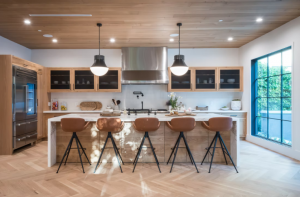
[Image source: Unsplash]
Our Suggestions
Solid Hardwood
Regular solid wood floors are a popular choice for kitchens. Like any wood, they trap in heat more, making it much more comfortable to walk barefoot on them. Not to mention that they give a sense of natural beauty to any kitchen, regardless of whether it’s a contemporary or traditional style. The soft sheen to a properly finished flooring will contrast wonderfully with the shiny surfaces and hard materials throughout the rest of the kitchen.
Engineered Hardwood
Engineered wood resembles regular solid wood, and in fact, is mostly still made of it. However, it’s put together in such a way, with softwood bound together and the grain of each layer running in different directions, that the strength and resilience of the wood are greatly enhanced. The quality level of the wood can be determined by simply looking at the depth of the top layer. The thicker this layer is, the better it will be in every way.
This wood is perfect for a kitchen environment that expects to have frequent and large spills. The wood is designed to resist solid wood’s natural tendency to expand, contract, and even bend as moisture seeps into it, keeping its shape and saving you potentially thousands on potential repairs and replacements. We have a full article on all the great benefits of engineered wood here.
Reclaimed Hardwood
Reclaimed wood is another option. It can come from either pure solid wood or used engineered wood. In many cases, the wood that is used is salvaged from old torn-down buildings such as abandoned barns and farmhouses. For a kitchen environment, reclaimed engineered wood will be the best choice.
With the proper finish applied to it, reclaimed engineered wood will give you both a strong flooring that’s highly resistant to wear and tear as well as giving a unique vintage look that is difficult to fake. It’s also good for the environment, as it means that you’re giving the wood a new lease on life as well as reducing by just a bit how many trees need to be cut down.
Laminate
If you’re desperate and in need of cheap flooring, laminate is an option. It is usually not recommended though for a good number of reasons. The first one being that it just doesn’t look or feel as good as real wood. All it really is are artificial materials compressed tightly together. There’s typically no real wood in it and is usually completely flat with a design printed on it. Naturally, it is the least durable of any flooring.
Within just a few years of use, the design on it will wear down and start to come off. It’s pretty much impossible to repair cleanly due to the fact that you can’t replace the design on it once it’s gone. Laminate wood also cannot be reused easily due to it, again, being entirely artificial. Once it wears out, there’s not much to do with it besides throwing it all out.
All that bashing aside, there are still a few upsides. For one, you can have any design you want on it. It doesn’t have to look like real wood at all. You could have zebra stripes or a brick pattern on it if you wanted to. You may also find it the easiest to clean due to it usually being completely flat. It’s also very easy to install thanks to the way they’re designed, with many of them having grooves to easily lock together with others. If you’re looking for something that you can install yourself, it could be the easiest option.
If you want to know more, we wrote a full article on laminate flooring here.
Conclusion
As long as you keep a few things in mind like understanding the risks and limitations, hardwood flooring can be a solid option for your kitchen. There is no need to give up on using wood just because of some unfounded worries.


